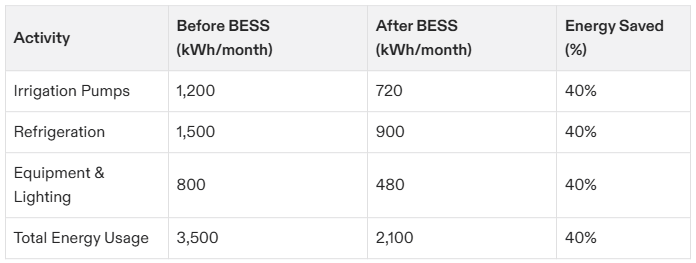
Energy storage for agriculture is transforming the way farms manage their energy demands. By utilizing solar energy storage, farmers are maximizing renewable resources, improving sustainability, and tackling unique operational challenges. This article highlights how BESS provides exceptional value in an underserved market with minimal competition.
A Solution Tailored for Agriculture
Agriculture relies heavily on energy for irrigation systems, refrigeration, and equipment operations. However, rural areas often experience unreliable grid electricity and higher energy costs. BESS, paired with solar energy, offers a practical solution by storing excess solar power for use during peak demand periods.
The result? Farmers benefit from more reliable energy, reduced operating costs, and increased control over their energy consumption. This combination not only boosts efficiency but fosters resilience against fluctuating energy prices and unexpected outages.
Chart 1: Farm Energy Costs With and Without BESS (USD per kWh)

By integrating BESS with solar energy, farms reduce their average monthly energy expenses by 40%, resulting in significant cost savings.
Where Agriculture Meets an Underserved Market
Despite agriculture being a key sector in the global economy, it has often been overlooked in tailored energy solutions. Investment in renewable energy technologies has traditionally focused on industrial and residential applications, leaving agriculture underserved.
With the falling costs of battery storage and solar technology, the agricultural sector is beginning to emerge as a prime market for energy storage solutions. These technologies address unique farming needs, such as varying irrigation schedules and the importance of maintaining cooling systems for perishable goods.
Unmatched Practical Benefits for Farmers
BESS provides unmatched practical value by helping farmers make the most of their solar energy. It ensures grid independence and stabilized operations, especially in regions prone to power fluctuations. Key benefits include:
- Irrigation Optimization
Solar energy stored during the day can power irrigation systems at night, ensuring efficient water usage without relying on grid electricity. - Refrigeration and Preservation
Farms can maintain the freshness of produce even during outages, thanks to BESS-powered backup energy. - Energy Cost Control
Storing energy during low-cost, off-peak hours and utilizing it during high-cost, peak periods saves money while reducing reliance on volatile grid pricing.
Chart 2: Energy Savings by Activity (Percentage Reduction in Energy Use)

Farms experience a significant reduction of up to 40% in energy usage after adopting BESS.
Regional Relevance and Impact
BESS adoption has proven highly effective in regions that depend heavily on agriculture. For instance, in South Africa, farms rely on solar energy storage to cope with frequent grid instability. Similarly, U.S. agricultural hubs have embraced BESS to sustain operations amid energy outages and rising electricity costs.
Regions with high agricultural activity can especially benefit from this technology. By integrating solar energy with storage, farms in these areas can address energy supply gaps, potentially turning them into energy producers rather than consumers.
Capturing an Untapped Niche
Compared to industrial and residential sectors, energy storage adoption in agriculture remains relatively low, making this an untapped niche. Solar and energy storage providers have an opportunity to lead the way in offering targeted solutions for farms’ unique challenges.
For example, irrigation-heavy crops like rice or vineyards that depend on consistent watering schedules represent a prime market for BESS. Poultry farms requiring stable temperatures in controlled environments offer another untapped application. Each of these use cases highlights a growing need for custom solutions within the agricultural sector.
Real-World Success Stories
Farmers who have invested in BESS systems see tangible results in both cost savings and operational reliability.
- Case Study 1: A poultry farm in South Africa reduced its dependency on coal-intensive grid electricity by integrating solar-powered BESS, cutting costs by 50% while stabilizing energy use during peak demand.
- Case Study 2: A U.K. dairy farm utilized BESS to offset grid power outages, ensuring consistent refrigeration and operational efficiency, while saving thousands on annual energy bills.
These examples exemplify the versatility and impact of using tailored energy storage systems in the agricultural industry.
Beyond Efficiency: Driving Sustainability
Energy storage technologies offer more than financial savings; they help farms take meaningful strides toward sustainability. Solar energy and BESS allow farms to slash carbon footprints, minimize fossil fuel reliance, and align with increasing environmental regulations.
By adopting renewable energy and battery storage systems, farming operations become better equipped to lead the charge in sustainable agriculture while optimizing productivity.
Chart 3: Reduction in Carbon Footprint (Metric Tons per Year)

Adopting BESS reduces carbon emissions by up to 50% for crop farms and by an average of 40% across all agricultural operations.
Closing Thoughts
Energy storage is no longer a luxury—it’s becoming an essential tool for modern farming. By blending solar power with advanced BESS technologies, farmers gain energy independence, protect their businesses from external risks, and contribute to a greener planet.
At Sunpal, we specialize in delivering tailored solar energy and battery storage solutions designed to meet the unique needs of the agricultural sector. With a firm commitment to sustainability, innovation, and customer success, we empower farmers to optimize energy use, reduce costs, and succeed in today’s competitive environment.
Partner with Sunpal to transform your farm’s energy management and achieve your sustainability goals. Together, we can cultivate a prosperous and sustainable future for agriculture.
